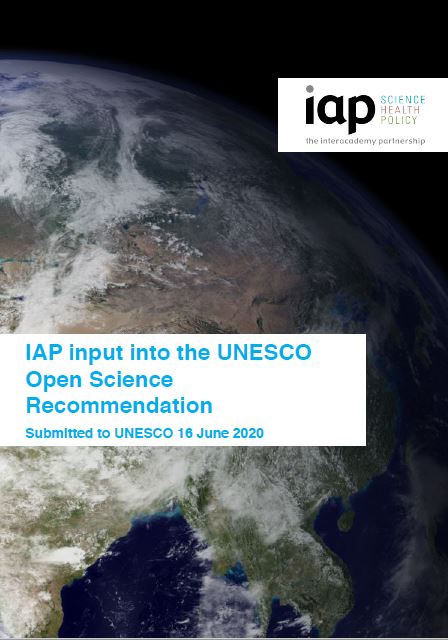During the 40th UNESCO General Conference in November 2019, the United Nations 193 Member States requested that UNESCO lead a global consultation on Open Science to develop globally-agreed norms and standards in the form of a “UNESCO Recommendation on Open Science”. As part of the consultation process, UNESCO requested the InterAcademy Partnership (IAP), the GYA and other science organisations to contribute input to inform the Recommendation.
To prepare this document to inform UNESCO’s development of the Open Science Recommendation from the perspective of its global network of academies, IAP members nominated experts to constitute an international working group. The GYA nominated Immediate Past Co-Chair Koen Vermeir (CNRS, France), who also co-led the GYA working group on Open Science until 2018, to be a part of the 10-member IAP ad hoc Open Science Working Group that was ultimately formed to provide this input.
Submitted on 16 June, the IAP’s input (available here) was developed by the 10 members of this ad hoc working group on behalf of IAP. The text also draws on and references responses to the UNESCO questionnaire for inputs into the development of the Open Science Recommendation that were submitted by individual member academies.
The IAP report presents 21 key recommendations directed towards multiple stakeholders – individuals, institutions and, more generally, all the open science actors who should collaborate to fully realize them. Especially relevant for Early Career Researchers are recommendations 4 and 20: “Ensure equity of access such that both producers and consumers of scientific outputs have equal access” and “Recognize and reward the merit of those who work in the creation and maintenance of open outputs. Revisit existing metrics for assessing research impact, going beyond publications. Reform the research evaluation system to incentivize open research practices.” Early Career Researchers can also contribute to realizing these recommendations, e.g. recommendation 3: “Create awareness among researchers about the many opportunities offered by openness.”
According to Koen, “The specificity of our report is that it focuses on Open Science as an enabler of global collaboration. Open Science helps to transcend geographic, temporal, social or cultural barriers, it reduces the global disparity in research capacity and strengthens scientific integrity, all of which enable better collaboration, which is the life-blood of science. Now ministers, policy-makers and stakeholders need to collaborate to make Open Science a reality.”
The IAP and its member academies, along with many other stakeholders, were also invited to complete a questionnaire about Open Science principles and the benefits and challenges of Open Science around the world.
On 23 July 2020, UNESCO held a Regional Consultation on Open Science for Western Europe and North America. Other regional consultations will follow.
